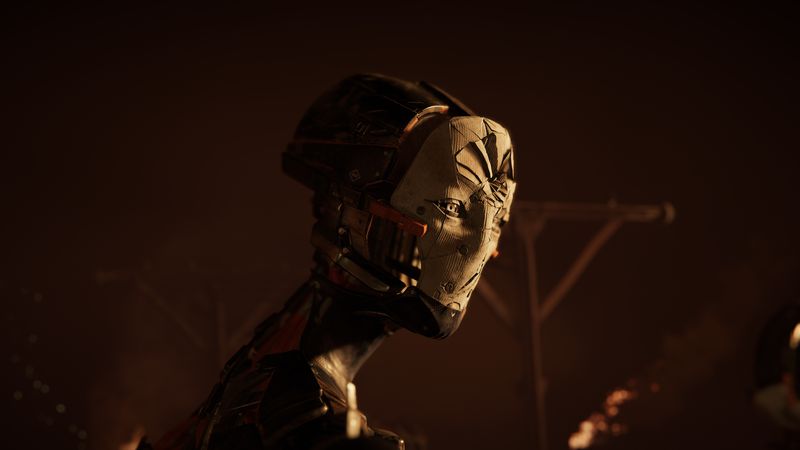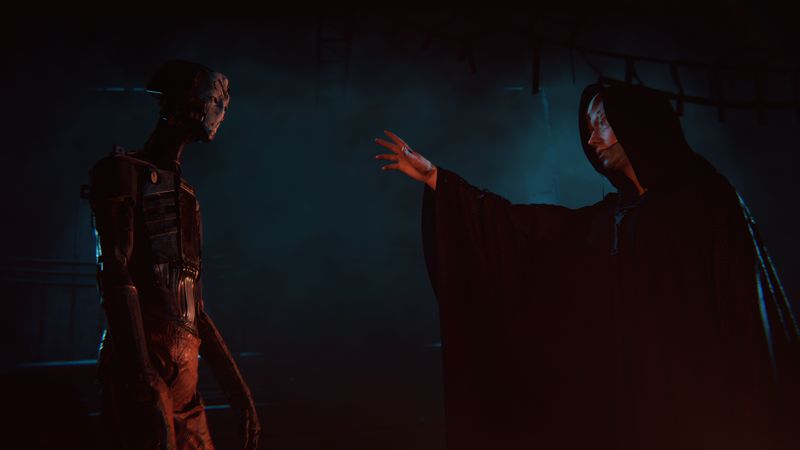Last year, Unity released a short film called Adam to demonstrate an important capability of its popular game engine that could be used for game developers and filmmakers alike: real-time rendering. The short caught the attention of people in the industry and, a year later, District 9 director Neill Blomkamp is partnering with the company for two followup shorts, Adam: The Mirror and Adam: The Prophet.
Adam ended on an ambiguous note. The short film, which followed a group of nameless, identical robots who are freed by a mysterious warlock-like machine, could have either lead to a utopian or dystopian world for the strange, sad robots. Blomkamp told Polygon that the decision to turn the protagonist’s story into a dystopian one instead of taking it in a positive direction seemed like the natural fit. Upon discussing his idea with the original creator of Adam, Veselin Efremov, putting the character’s future into an abysmal, hellish world was the next natural step.
“The idea was to build the character and give them something to connect to from the first piece,” Blomkamp told Polygon from offices in San Francisco. “I’ve never actually executed something where there was existing IP that could really be taken anywhere. I sat with the first time and I came up with this bible or where I think the story went, where the world is and what lead to the first film. Once we did that, we wrote two short films that were informed by the creator.
“We know where the story goes, but it exists in this Star Wars, open-world kind of landscape we get to explore.”
Adam: The Mirror follows the robotic protagonist as he’s confronted with the person he was in a previous life. Unlike the first short film, which acted as a demo for Unity’s platform, Adan: The Mirror has a captivating story best suited to be played out over multiple episodes. When asked why Blomkamp decided to team with Unity for the project, the director said he wanted the opportunity to work with real-time rendering software that could change the way film was consumed by audiences.

Blomkamp is a purveyor of experimentation in film. Earlier this year, the director began working on releasing short films produced by his company, Oats Studios, that viewers could purchase “downloadable content” for. These DLC packages included the original video files, scripts and other tools that budding filmmakers would need to remix the film themselves. The idea, Blomkamp told Polygon, was to allow everyone to contribute their ideas to what Oats Studios was doing. Real-time rendering, which refers to producing and analyzing images in real time to allow for multiple points-of-view, will play a big role in cinema’s future, according to Blomkamp.
“If you look at a Blu-ray of a traditional film, that’s locked,” Blomkamp said. “This film is downloadable for any user who has a computer powerful enough to play it on. It is live and being rendered live from any angle that you choose. It’s the interactivity that makes it different. It becomes live and editable that they can interact with. It’s where the idea of remixing in the 21st century plays in. The future isn’t with the studios; the studios will be working backwards trying to catch up.”
From Unity’s perspective, the idea behind Adam: The Mirror and Adam: The Prophet is an opportunity to showcase the potential for the platform and its capabilities for filmmakers alongside game developers. Blomkamp admitted that he didn’t know anyone who was using Unity in the film space, but believed that could change. When asked by Polygon whether film editors would react to unity the way specific developers in gaming have turned away from unity, Isabelle Riva, Unity’s head of “Made with Unity” program, said it wasn’t a concern.
“It’s a real time engine and there’s no right way to use Unity,” Riva said. “I think because it’s so extensible and people can do different things with it, it becomes known as a generalist program.”

Blomkamp’s short film with Unity lasts just under 10 minutes, making it one of the shorter projects he’s worked on. The CGI and animation is beautiful, but Unity’s platform still isn’t being adapted by the mainstream film industry. The closest the industry has come to is with ILM and Star Wars, which uses real time rendering to process the footage captured.
Blomkmap believes the industry can get there, but admits it’s still in an experimental phase for filmmakers. Chris Harvey, VFX Supervisor at Oats Studios, has worked on multiple, big-budget feature films including Tron: Legacy and Zero Dark Thirty. Harvey told Polygon it isn’t so much about adapting the technology as moving beyond the fact that it’s a game engine.
“Some people dismiss Unity as a game engine,” Harvey said. “But it’s not just a game engine. We made a movie in it. I have debates with artists all the time about different software they use to create visual effects. ‘Oh, well you’re not using X, you’re using Y.’ Unity is a pencil. It’s another tool to use a story. And I think even the stigma ‘Oh, it’s a game engine’ will change.”
Like Adam, Adam: The Mirror will be available to watch on YouTube tonight. Adam: The Prophet will be available to watch later this year.
